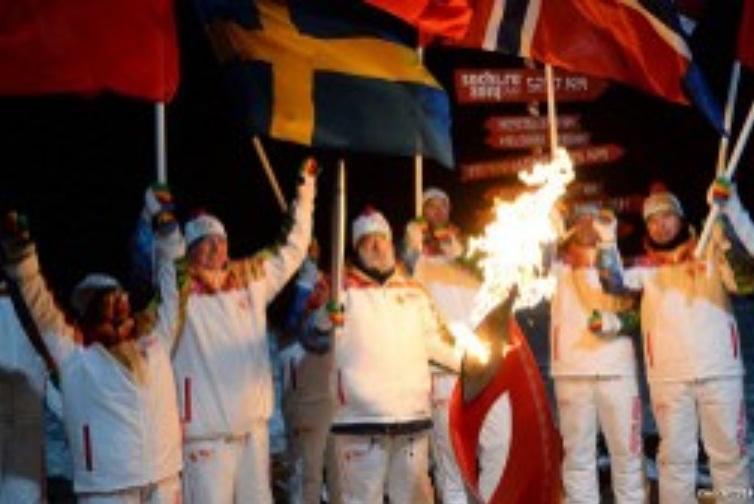Sochi becomes rallying cause for gay rights activists

NORTH POLE : A handout picture taken during the Sochi 2014 Winter Olympic torch relay on October 25, 2013, and released by the Sochi 2014 Winter Olympics Organizing Committee shows the torch relay on the North Pole. AFP
SOCHI — To the surprise and displeasure of the Kremlin, the Winter Olympics in Sochi have become a rallying cause for the gay rights movement after Russia adopted a law slammed around the world as homophobic.
Russian President Vladimir Putin in June signed off on a law that bans the dissemination of so-called “gay propaganda” to minors which activists fear could be used for a broad crackdown on gays.
The law was agreed amid increasingly conservative attitudes in Russian politics on moral issues as the country seeks to promote family values and reverse its long term population decline.
But the global backlash against the law appeared to take the Kremlin by surprise as activists are making the Games in the Black Sea city the focal point of their anger 100 days before the start of the event.
Hashtags like #boycottSochi have gained popularity on Twitter. British actor Stephen Fry called for Russia to be stripped of its right to host the Games and Russian officials are being forced to justify the law at every public appearance.
This month 15 American and European athletes, including former tennis star Andy Roddick, wrote an open letter to the new president of the International Olympic Committee Thomas Bach asking for a clear position on the issue.
Russia has insisted there will be no discrimination at the Games against gays, saying that athletes and spectators of any sexuality are welcome to participate or visit Sochi.
But officials have also warned that the law will not be suspended for Sochi, meaning that participants could in theory be fined or arrested for disseminating “gay propaganda” to minors.
This could include telling a teenager it is perfectly normal to be gay or possibly even showing the rainbow stripes of the gay rights movement at any event attended by Russians under the age of 18.
Russian officials prefer not to utter the words “gay” or “homosexual” and instead describe the LGBT community as “people of a non-traditional sexual orientation.”
“We are seeking to protect minors — and not just from propaganda of non-traditional relations but from many other things. Like, for example, drug use, alcoholism and smoking. From many bad habits,” Sports Minister Vitaly Mutko said in August.
‘People should be aware of the discrimination’
It remains to be seen what sort of protests athletes could make in Sochi against the laws. A handful of openly gay sportspeople like New Zealand speed skater Blake Skjellerup will be competing.
But even the smallest actions could unleash a furore — at August’s World Athletics Championships in Moscow Swedish high jumper Emma Green-Tregaro caused a huge controversy simply by painting her finger nails in the rainbow colors of the LGBT movement in the preliminary round.
She then repainted them for the finals.
“People should be aware of the discrimination, silencing of activists, and other human rights abuses that Russia isn’t showcasing,” said Jane Buchanan, associate director for Europe and Central Asia at Human Rights Watch.
The gay community in the city of 350,000 is discreet to say the least and unlikely to want to use the Olympics to highlight their cause. Even more than in Moscow, gay rights are off the political agenda in Sochi, where southern macho attitudes prevail.
Sochi has just one major openly gay club whose owner Andrei Tanichev slammed the “idiotic law which gives a green light to the skinheads, nationalists and fascists” who want to commit homophobic attacks.
In Russia, homosexuality was considered a crime until 1993 and classified as a mental illness up to 1999. The gay community still suffers from a negative attitude in society and repression from the authorities.
Russian police have repeatedly broken up even the smallest gay rights protests in Moscow and Saint Petersburg with activists also having to suffer harassment from ultra-conservative protestors who seek to disrupt their actions.
Nevertheless gay rights protests in Russia have never reached a mass scale, with even the anti-Kremlin opposition steering clear of the issue, while many Russian gays themselves prefer to keep a low profile.
Russian lawmakers have meanwhile been mulling a new law that would deprive homosexuals with children of their parental rights — a bill that had been scheduled for debate next February.
The pro-Kremlin lawmaker who authored the bill retracted it after a global uproar but said he would reintroduce it after tweaking some of the wording.














